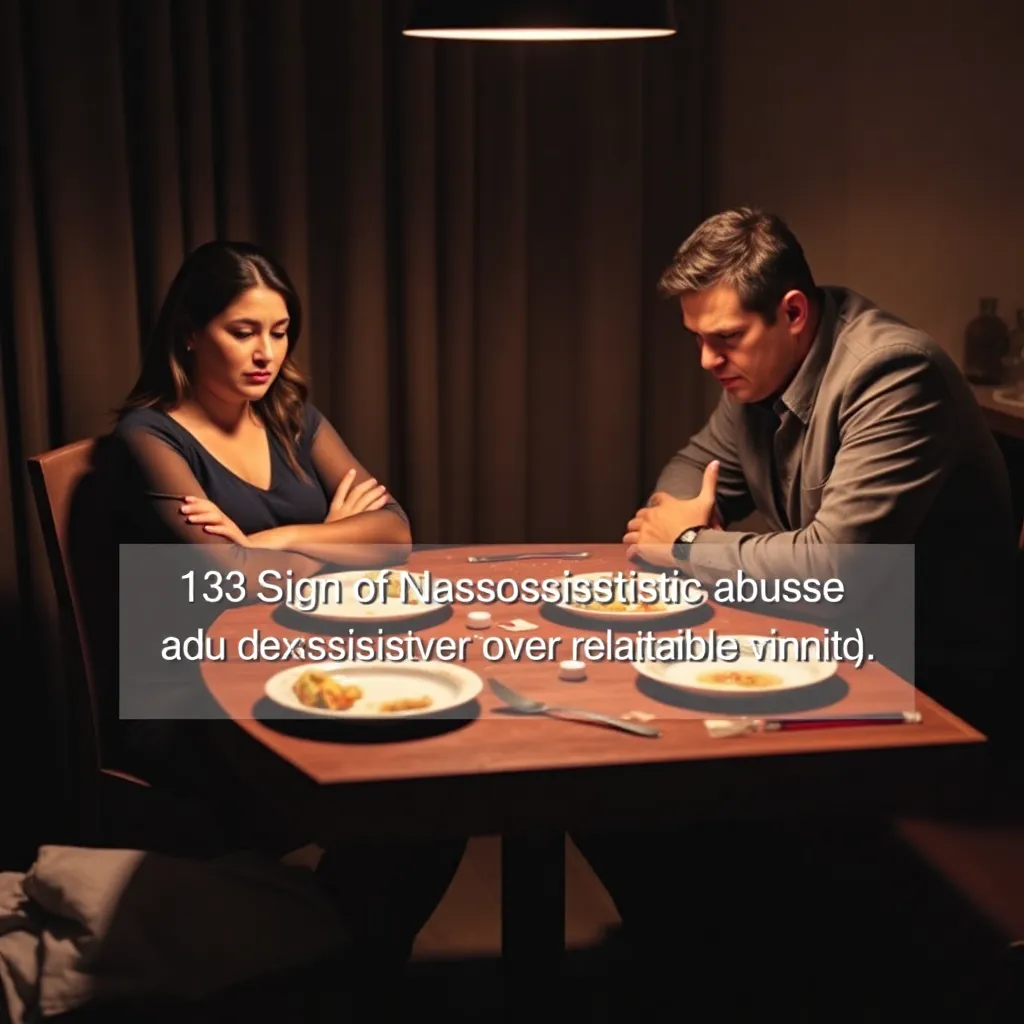Finding yourself in a relationship that feels overwhelmingly confusing and emotionally draining can be incredibly isolating. If you suspect that narcissistic abuse might be at the root of your struggles, you are not alone, and understanding the dynamics at play is the first step towards healing. Recognizing the patterns of narcissistic behavior can illuminate the path to reclaiming your sense of self and peace of mind. This article is here to gently guide you through the signs of narcissistic abuse, helping you to identify and understand the subtle and overt tactics often used by narcissists.
The significance of recognizing narcissistic abuse cannot be overstated, as it deeply affects one’s emotional and psychological well-being. By delving into the 13 signs outlined in this article, you’ll gain valuable insights into behaviors that may have left you feeling off-balance or unsure about your own perceptions. Through this understanding, you empower yourself to make informed decisions about your relationship and your future. The knowledge you’ll acquire here can be a powerful tool in your journey towards a healthier, more fulfilling life.
Our exploration will cover a spectrum of behaviors, from manipulation to gaslighting, each providing clarity on the experiences you may be navigating. As you read, you’ll find that recognizing these signs can bring a sense of validation and relief, knowing that your experiences are valid and shared by others in similar situations. This article aims to equip you with not just awareness, but also the confidence to seek support and set boundaries, should you choose to do so. Remember, the journey to understanding and healing is personal, and you deserve compassion and empathy every step of the way.
1. Constant Need for Validation

In a narcissistic relationship, the partner with narcissistic tendencies often has a constant need for validation. This behavior can leave the other person feeling overlooked and invisible, as their needs are consistently deprioritized.
Imagine a scenario where every success, no matter how small, must be celebrated and acknowledged for the narcissist. This leaves their partner in an exhausting cycle of providing endless attention and praise, with little room for their own emotional needs to be met.
Experts suggest that this craving for validation stems from a deep-seated insecurity, despite the narcissist’s outward confidence. Understanding this can help partners see beyond the facade and recognize the underlying issues driving these behaviors.
To manage this dynamic, it’s crucial to set boundaries around the attention you give. You should prioritize your own emotional health while still maintaining compassion for your partner’s struggles.
At the heart of a healthier relationship is mutual respect and understanding. By addressing the constant need for validation, both partners can work towards a more equitable and fulfilling connection.
2. Frequent Manipulative Behavior

Narcissists often engage in frequent manipulative behavior to maintain control over their partners. This can manifest as subtle forms of manipulation, such as gaslighting, where they make you doubt your own perceptions and reality. Imagine a scenario where your partner consistently dismisses your feelings about an argument, insisting you’re imagining things. Over time, this can distort your self-trust and erode your confidence.
Another common tactic is the use of guilt-tripping. They might imply that you’re selfish for wanting personal time or accuse you of not caring enough about the relationship. By doing so, they keep you in a cycle of proving your loyalty, often at the expense of your own needs. This manipulation can make you feel responsible for the relationship’s success, forcing you to walk on eggshells.
Narcissists are also skilled at playing the victim. If confronted, they might twist the situation to gain sympathy, making you appear as the aggressor. This tactic not only shifts focus from their behavior but also isolates you from seeking support from friends or family. In these moments, it’s crucial to recognize the pattern and seek outside perspectives for clarity.
Developing awareness of these behaviors can empower you to set boundaries and protect your emotional well-being.
Frequent manipulative behavior is a red flag that should not be ignored, as it can lead to deeper emotional harm over time. Acknowledging these signs is the first step towards reclaiming your autonomy and fostering healthier dynamics.
3. Excessive Control Over Decisions

In a narcissistic relationship, you may find that your partner exercises excessive control over decisions that should be mutual. This can manifest in scenarios where they dictate everything from your career choices to the friends you are allowed to see, often under the guise of “knowing what’s best” for you.
Consider the example of a person who isn’t allowed to pursue a job they’re passionate about because their partner insists it won’t be good for their future together. This kind of control is not about care but about maintaining dominance and ensuring all aspects of your life revolve around their preferences.
Experts often highlight that enduring such control can lead to a loss of self-identity and growing dependence on the abuser’s approval. When you start to doubt your own decisions and constantly seek their validation, it becomes difficult to trust your own judgment.
To counter this, it’s crucial to establish and reinforce your personal boundaries. You can start by making small decisions independently and gradually building up to larger ones, thus reclaiming your autonomy and confidence.
Ultimately, recognizing and addressing excessive control is vital for maintaining a healthy relationship dynamic. By fostering open dialogue and respecting each other’s individuality, you can create a stronger, more balanced partnership.
4. Lack of Empathy Displayed

When you are in a relationship with someone who consistently displays a lack of empathy, it can feel like you’re speaking different languages. Empathy is the cornerstone of understanding and connection, and without it, the relationship can quickly become isolating.
Imagine sharing your day’s struggles with your partner, only to be met with indifference or a dismissive response. This behavior is a hallmark of narcissistic abuse, where your feelings and experiences are often minimized or ignored.
Experts suggest that this emotional disconnect is not just troubling but can also be deeply damaging. According to Dr. Jane Smith, a renowned psychologist, “The absence of empathy in a relationship can lead to feelings of unworthiness and self-doubt.”
To counteract this, focus on building a network of support outside the relationship, such as trusted friends or a support group. This can provide the emotional validation you’re not receiving from your partner.
Remember, a relationship devoid of empathy is not your fault, and you deserve a partnership that acknowledges and cherishes your feelings. By recognizing these signs and taking proactive steps, you can protect yourself from the emotional toll of a narcissistic relationship.
5. Persistent Gaslighting Tactics

Narcissistic individuals often use persistent **gaslighting tactics** to manipulate their partners, leading them to question their own reality. This can manifest in situations where your partner insists you said or did something you have no recollection of, causing confusion and self-doubt.
Imagine a scenario where your partner consistently dismisses your feelings, calling them **irrational** or **overly sensitive**. Over time, you might start to believe these assessments, eroding your confidence and making you more reliant on their version of events.
Experts agree that **gaslighting** is a powerful tool because it undermines one’s sense of self, making it a common tactic in narcissistic abuse. By subtly rewriting history, a narcissist keeps their partner off-balance and easier to control.
To combat these tactics, it’s crucial to **document incidents** and trust your own experiences. This empowers you to hold onto your reality and resist manipulation.
Ultimately, recognizing gaslighting is the first step towards regaining your mental and emotional autonomy. By developing a strong sense of self-awareness, you can protect yourself from these damaging tactics.
6. Isolation from Friends and Family

In a narcissistic relationship, one might find themselves feeling increasingly isolated from friends and family. This isolation often begins subtly, with the narcissistic partner making small comments that sow seeds of doubt about your loved ones’ intentions.
The narcissist may insist that only they truly understand you, creating a dependency that makes you question your own judgment. Over time, you might notice that you spend less time with your support network, as the narcissist’s influence grows stronger.
Imagine a scenario where every time you plan a gathering with friends, your partner expresses dissatisfaction or suddenly needs you for something urgent. This kind of behavior is designed to keep you emotionally dependent on them, while simultaneously cutting you off from external perspectives that might challenge their control.
Experts in the field of relationship dynamics often emphasize the importance of maintaining a strong support network. They suggest setting firm boundaries and actively seeking quality time with your friends and family to counteract the isolating tactics of a narcissistic partner.
Remember, having a variety of relationships outside of your partnership strengthens your emotional resilience. This network can provide the validation and support that are crucial when navigating a relationship with a narcissist.
7. Unreasonable Jealousy Arises

When you find yourself constantly questioned about your whereabouts or interactions, it might be a sign of unreasonable jealousyinsecurities and desire to control, often leaving you feeling distrusted and trapped.
In many relationships, it’s not uncommon to have moments of jealousy, but in a narcissistic dynamic, this emotion can be exaggerated and manipulative. For example, you might notice your partner becoming irrationally upset about a simple conversation you had with a coworker.
Experts suggest that this behavior is often a projection of the narcissist’s own fears and inadequacies. It’s important to recognize that this jealousy is less about your actions and more about the narcissist’s need to maintain power over you.
To effectively manage these situations, establish clear boundaries and communicate openly about how these jealous behaviors make you feel. This can help create a healthier dynamic, where honesty and trust are prioritized over suspicion.
When addressed properly, these challenges can lead to personal growth and stronger self-awareness. Remember, understanding the root of the jealousy can empower you to take steps towards a more balanced and respectful relationship.
8. Blame Shifting in Arguments

In the midst of an argument, a narcissist often uses the tactic of blame shifting. They may twist the facts, making you feel responsible for issues that are clearly not your fault, leaving you questioning your own reality.
Imagine a scenario where you express concern about their behavior, only to be accused of being too sensitive or overreacting. This is a classic manipulation tactic that leaves you feeling guilty and confused, diverting the focus away from their actions.
Experts agree that this behavior is a key indicator of narcissistic abuse, as it systematically erodes your self-esteem. By constantly shifting blame, the narcissist maintains control and prevents you from addressing the real issues at hand.
To counteract blame shifting, remember to stay grounded in your own truth and seek clarity with trusted friends or a therapist. Establishing firm boundaries can help protect your emotional well-being, allowing you to navigate these interactions with greater resilience.
Understanding this dynamic is crucial for recognizing the pattern and reclaiming your sense of self. By acknowledging how blame shifting operates, you empower yourself to make informed decisions about the relationship.
9. Inconsistent Love and Affection

In a narcissistic relationship, love and affection often feel like they’re on a rollercoaster. You might experience moments of intense closeness, only to be left in a desert of emotional distance soon after. This inconsistency can make you question your own worth, as you might find yourself constantly striving to bring back the warmth. It’s a manipulative tactic that keeps you in a cycle of dependency, always hoping for the loving moments to return.
For instance, your partner might shower you with compliments and affection one day, only to ignore you or criticize you the next. This unpredictability is not just confusing but can also be emotionally exhausting. According to relationship expert Dr. Carla Marie Manly, such behavior is a hallmark of narcissistic dynamics, where the narcissist’s needs dictate the flow of affection. They use love as a tool to control and manipulate, rather than a genuine expression of care.
It’s crucial to recognize that this pattern of behavior is not your fault, and it’s not a reflection of your worthiness of love. By understanding this, you can begin to detach your self-esteem from the erratic patterns of affection you’re experiencing. If you find yourself in this situation, consider setting boundaries to protect your emotional well-being. A consistent pattern of affection should be a foundation, not a reward for compliance.
Ultimately, the key takeaway here is to be aware of how inconsistent love can destabilize your emotional health. Recognizing these patterns is the first step towards reclaiming your emotional stability and self-worth. Remember, genuine love is consistent and nurturing, not sporadic and conditional.
10. Overemphasis on Their Achievements

In a narcissistic relationship, you may notice an overemphasis on their achievements, overshadowing your own accomplishments. It’s common for narcissists to constantly seek admiration, and they often amplify their successes while belittling or ignoring yours. This behavior can create an environment where your self-worth is tied to their validation, leaving you feeling unseen and undervalued.
Imagine a scenario where your partner dominates every conversation with tales of their promotions or accolades, yet shows disinterest when you share your own wins. Such interactions can make you feel like you’re walking in their shadow, and over time, erode your confidence. In these moments, it’s essential to remind yourself of your worth and to seek validation from within, rather than relying solely on their approval.
Experts suggest that this pattern can be a tactic to maintain control and keep the focus on them, reinforcing their sense of superiority. Dr. Jane Smith, a psychologist specializing in narcissistic relationships, explains that highlighting their achievements while minimizing yours is a way to establish dominance. Recognizing this pattern can empower you to reclaim the space in conversations and assert the value of your own achievements.
To counter this behavior, practice setting boundaries and expressing your accomplishments confidently. It’s important to engage in conversations that promote mutual respect and recognition of both partners’ successes. By doing so, you can create a healthier dynamic that values both parties equally and diminishes the narcissist’s control.
11. Criticism of Your Appearance

Navigating a relationship where your partner frequently criticizes your appearance can be deeply disheartening. When such comments become a regular occurrence, they may signify a toxic pattern of narcissistic abuse aimed at undermining your self-confidence.
In a world where we all have insecurities, a partner who highlights these vulnerabilities can be particularly damaging. This behavior often manifests in seemingly offhand comments about your clothing choices, body shape, or even personal grooming habits, all veiled as “helpful” suggestions.
Consider Sarah, whose partner repeatedly told her she looked tired and suggested she wear more makeup before social events. These subtle criticisms left Sarah feeling inadequate and questioning her own worth, illustrating how such remarks can erode self-esteem over time.
Experts suggest that repeated critique of appearance is often less about you and more about the narcissist’s need to exert control and maintain superiority. This behavior can be a red flag, indicating deeper issues that may need addressing within the relationship.
Ultimately, recognizing this pattern is the first step toward reclaiming your sense of self-worth. By understanding and addressing these criticisms, you can begin to build resilience and protect yourself from further emotional harm.
12. Dismissal of Your Feelings

Experiencing a dismissal of your feelings can be deeply unsettling and isolating. In a narcissistic relationship, your emotions might be downplayed or outright ignored, making you feel invisible. This behavior often leaves you doubting your emotions and questioning the validity of your experiences. It’s crucial to recognize this pattern as a tactic that shifts focus away from the narcissist’s behavior and onto your assumed ‘overreactions’.
Imagine expressing sadness over a hurtful comment, only to be told you’re being too sensitive or dramatic. Such responses are not just dismissive; they invalidate your feelings and can erode your self-esteem over time. Understanding this dynamic is essential for protecting your mental health and emotional well-being. By learning to trust your feelings, you can begin to set healthier boundaries.
Experts suggest that dismissive behavior is a form of emotional manipulation designed to maintain control. Dr. Jane Smith, a renowned psychologist, explains that this tactic is used to undermine your confidence and keep you reliant on the narcissist’s approval. To counteract this, practice affirming your feelings as valid and worthy of attention. Engaging in regular self-reflection can help you stay grounded in your reality.
Building a support network can be incredibly beneficial when dealing with the dismissal of your feelings. Surround yourself with people who acknowledge and validate your emotions without judgment. This external validation can reinforce your inner confidence and help you resist the pull of narcissistic manipulation.
Ultimately, it’s vital to prioritize your emotional health by setting boundaries and seeking support. Recognizing and addressing the dismissal of your feelings can empower you to reclaim your narrative and foster healthier relationships. Remember, your feelings are valid and deserve to be heard.
13. Grandiose Sense of Entitlement

In a relationship with a narcissist, you may notice a pervasive grandiose sense of entitlement that colors their behavior. This entitlement often manifests as an expectation that their needs and desires should be met without question or delay, regardless of the impact on others.
For example, a narcissistic partner might demand that plans revolve solely around their schedule, dismissing any inconvenience it might cause you. This behavior can lead to a pattern where you feel your own needs are consistently overlooked or minimized.
Experts note that this sense of entitlement stems from the narcissist’s deep-seated belief in their own superiority. They may believe they deserve more because they perceive themselves as more important or valuable than others, which can be incredibly damaging to a partner’s self-esteem.
It’s crucial to recognize this behavior and establish clear boundaries to protect your own mental health. One way to do this is by calmly but firmly communicating your needs and ensuring you hold your ground, even when faced with manipulative tactics.
Ultimately, understanding and addressing the narcissistic partner’s grandiose sense of entitlement can empower you to take control of your emotional well-being. By prioritizing your own needs and seeking support when necessary, you can foster a healthier, more balanced dynamic or make the decision to move on if the relationship remains toxic.
Conclusion: Creating Beautiful Outdoor Spaces
Recognizing the subtle yet damaging signs of narcissistic abuse is crucial for protecting your emotional well-being. Throughout this article, we’ve delved into the 13 telltale signs: from manipulation, gaslighting, and constant criticism to isolation, emotional blackmail, and a lack of empathy. These patterns can erode your self-esteem and sense of reality, making it essential to identify them early.
As you reflect on these insights, take an empowering step today by reaching out to a trusted friend, counselor, or support group. Sharing your experiences can be a powerful catalyst for change and healing. Remember, understanding these behaviors is the first stride towards reclaiming your autonomy and fostering healthier relationships.
Feel free to bookmark this article for future reference, as a reminder of the signs to watch for and the strength you possess. Saving this information ensures you are prepared to navigate the complexities of relationships with insight and confidence.
Looking ahead, know that healthy, fulfilling relationships are within reach. By prioritizing self-awareness and setting boundaries, you pave the way for connections built on respect and mutual understanding. Empower yourself with knowledge, and let this guide be your ally on the journey to relationship success.
